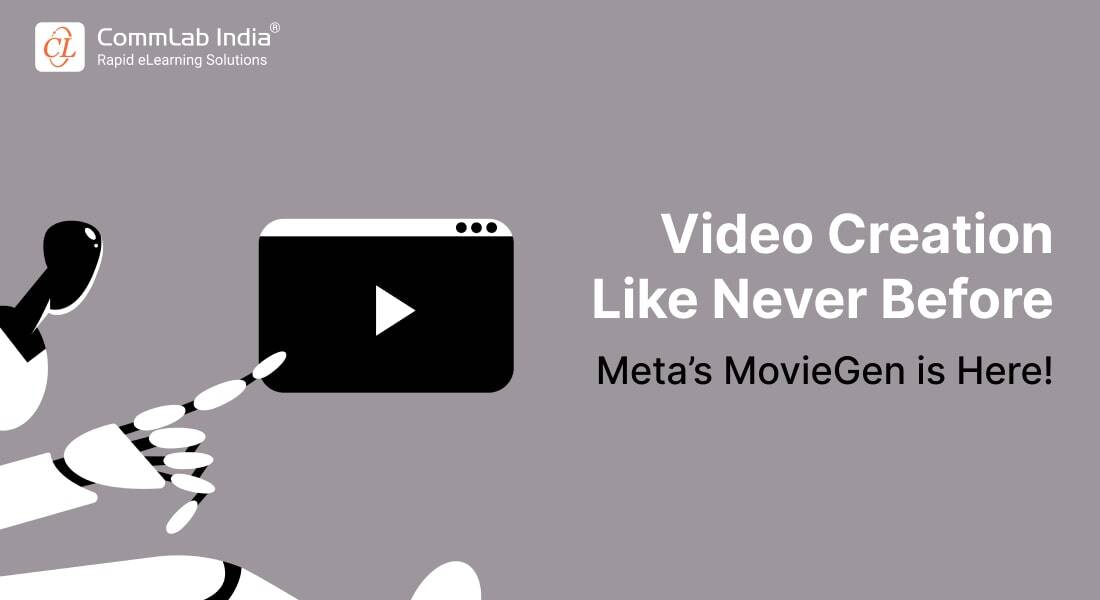Meta’s MovieGen: A Game-Changing Tool in AI-Powered Video Creation

Having a well-trained workforce has always been a success mantra for businesses across the world. Though traditional corporate training programs have served this purpose for a long, today’s dynamic workforce needs something beyond the traditional mode. It is impossible to tie down current-day employees and make them take lengthy corporate training sessions. So, what can be done about it?
Are you wondering about the same?
Here’s AI for you… AI a.k.a. artificial intelligence has been causing a lot of buzz and all for the right reason. You may have already heard how AI tools can be used to streamline corporate training and for eLearning translation, but did you hear about AI tools for video creation? Yes, that’s true, AI videos are an amazing way to create and deliver digital learning.
→ Download Now: Are You Ready to Charm Your Learners with the Magic of Videos?
Table Of Content
- What are AI Videos and What Role Do They Have in Corporate Training?
- When and Where to Use AI Videos in Corporate Training?
- What are the AI Video Creation Best Practices?
- Exploring an Unmissable GenAI Video Creation Tool — What’s the Hype?
What are AI Videos and What Role Do They Have in Corporate Training?
AI Videos Are Transforming the Way Employees Learn And Develop Their Skills.
The benefits they offer include:
1. Enhanced Engagement
2. Consistency and Standardization
3. Personalized Learning
4. Cost and Time Savings
AI corporate training videos are a relatively new concept. These videos utilize AI technology to create engaging and interactive learning experiences for employees. They can be used for a variety of purposes, from employee onboarding to ongoing professional employee training and development.
One of the key benefits of AI videos is their ability to adapt to each individual learner’s needs and preferences. The technology analyzes data such as past performance and feedback, then uses that information to generate personalized content that resonates with each employee. Additionally, AI videos can help companies save time and resources by automating certain aspects of the training process. For example, they can provide instant feedback on quizzes or assessments, reducing the need for manual grading.
Overall, AI videos have great potential in enhancing corporate training programs and improving employee engagement and retention. As this technology continues to evolve, it will be interesting to see how companies incorporate it into their overall digital learning strategies.
When and Where to Use AI Videos in Corporate Training?
Wowed by the benefits, aren’t you? Well, AI in corporate training videos does make video-based learning more effective and fun but are you wondering about their application?
Here’s a video to help you understand their usage:
What are the AI Video Creation Best Practices?
When it comes to using AI for corporate training video creation, there are a few best practices to keep in mind.
- Ensure the video is high quality and engaging to capture employees' attention.
- Make the video relevant to the corporate training program, showing clear connections to employees' roles.
- Keep the video short and concise—ideally under 10 minutes—with valuable, actionable content.
How AI in Video Creation Evolved?

AI video creation has come a long way from its initial stages. It started with tools that could perform basic tasks like color correction, sound adjustments, or even suggesting edits. However, with the emergence of deep learning models and neural networks, AI capabilities have expanded exponentially. The media industry is no longer just experimenting with AI—it’s fully integrating it into production pipelines. Generative AI, like MovieGen, represents the next stage of this evolution.
What makes this shift so exciting is the potential for AI to not just assist in media creation but to lead the charge. We’re seeing AI-generated content that rivals human-made media in quality, and MovieGen is one of the clearest examples of how powerful this technology has become. By offering more than just minor editing or filtering, MovieGen can create entirely new pieces of content from scratch. This has the potential to democratize media creation, allowing even those with limited resources or technical skills to produce professional-grade videos.
Exploring an Unmissable GenAI Video Creation Tool — What’s the Hype?
Meta’s MovieGen is causing quite a stir in the video creation world and it’s easy to see why. Imagine being able to generate an entire video—complete with visual effects, scripts, and edits—with minimal human input. Sounds futuristic, right? Well, that future is now, thanks to Meta’s innovative generative AI model called MovieGen. Designed specifically for video creation, this model is changing the way both individuals and businesses approach video production. Whether you’re a professional filmmaker or a content creator working from your living room, MovieGen promises to be a tool that can streamline the video creation process while maintaining creative control.
How MovieGen Works: The Technical Magic
So, how does MovieGen achieve this seemingly magical feat? At its core, the technology behind MovieGen is based on Meta’s media foundation models, which are advanced generative AI systems trained on vast amounts of video data. These models are designed to recognize and replicate the patterns, styles, and structures found in human-made video content.
When you use MovieGen, you don’t need to input detailed instructions or spend hours editing your work. The AI can take basic prompts, such as a short script or a concept, and create a fully realized video complete with transitions, effects, and even music if required. The model is adept at understanding the tone and style you’re going for, which is why the results often feel tailor-made, despite the minimal effort involved from the user.
Moreover, the model is continually learning. Each video generated adds to its growing pool of knowledge, making it more proficient at producing diverse content that can suit a wide range of industries—from marketing and entertainment to training and personal vlogs. This adaptability is key to MovieGen’s success, and as the AI continues to evolve, its outputs will only improve.
How MovieGen Revolutionizes Corporate Training Video Creation
AI in corporate training video creation is no longer just a future concept—MovieGen is making it a reality for corporate training. Creating professional training videos can be a time-consuming and complex process. From planning and scripting to shooting, editing, and rendering, it often requires significant effort and technical expertise to produce polished results. MovieGen streamlines this process, making it faster and easier to create engaging, high-quality corporate training content for your team.
MovieGen makes corporate training video creation effortless. Imagine drafting your training concept, inputting it into the system, and receiving a polished video in a fraction of the time it usually takes. With its versatile AI, MovieGen handles any format or style—whether it’s animated modules, role-play scenarios, or professional walkthroughs.
It's not just about saving time—it’s about empowering teams to focus on content and messaging without worrying about production details. This efficiency is a game-changer for businesses, enabling high-quality video creation without the need for massive budgets or production teams. MovieGen levels the playing field, making it easy for companies of any size to deliver professional, impactful training content. And that’s just the start—there’s much more to this tool that sets it apart in the AI video creation space.
What Makes MovieGen Different from Other Video Creation Tools?
Generative AI tools aren’t new, but MovieGen distinguishes itself from the competition in several ways. For starters, most AI video tools focus on narrow tasks, such as helping with post-production editing or generating simple animations. In contrast, MovieGen offers a more holistic approach to video creation, handling everything from concept to final output.

Another standout feature is its integration with Meta’s other technologies, particularly in the realms of VR (Virtual Reality) and AR (Augmented Reality). Imagine creating a video in MovieGen and then using Meta’s VR tools to immerse yourself in the scenes you’ve generated. Or, perhaps, you could generate AR-enhanced content that allows viewers to interact with the video in real-time. This kind of cross-technology synergy is something few other platforms offer, making MovieGen a truly unique solution.
Then there’s the fact that MovieGen is designed to be intuitive. You don’t need to be an expert in AI or video creation to use it. With a simple user interface and powerful behind-the-scenes algorithms, MovieGen can turn anyone into a creator. This accessibility is crucial in an age where content creation is becoming democratized, and MovieGen is at the forefront of this movement.
What’s Next for MovieGen?
Meta’s future plans for MovieGen are ambitious, to say the least. As the model continues to improve, we can expect to see even more advanced features roll out—perhaps deeper integration with VR and AR tools, better support for complex narratives, or enhanced user interfaces that make video creation feel as natural as writing a text message.
There’s also potential for MovieGen to be integrated into social media platforms like Instagram and Facebook, allowing users to create short-form video content directly within the apps. This would not only make content creation accessible to a wider audience but could also spur a new wave of user-generated media.
Wrapping Up
AI in videos offers a unique way to engage and train employees, with almost limitless potential. Companies leveraging AI video creation can significantly boost employee performance, retention, and satisfaction, making it a must-adopt strategy for the future of work. Ready to take your corporate training to the next level? Download our eBook to discover how AI can elevate your training videos and pave the way for immersive, adaptive, and impactful learning experiences!






